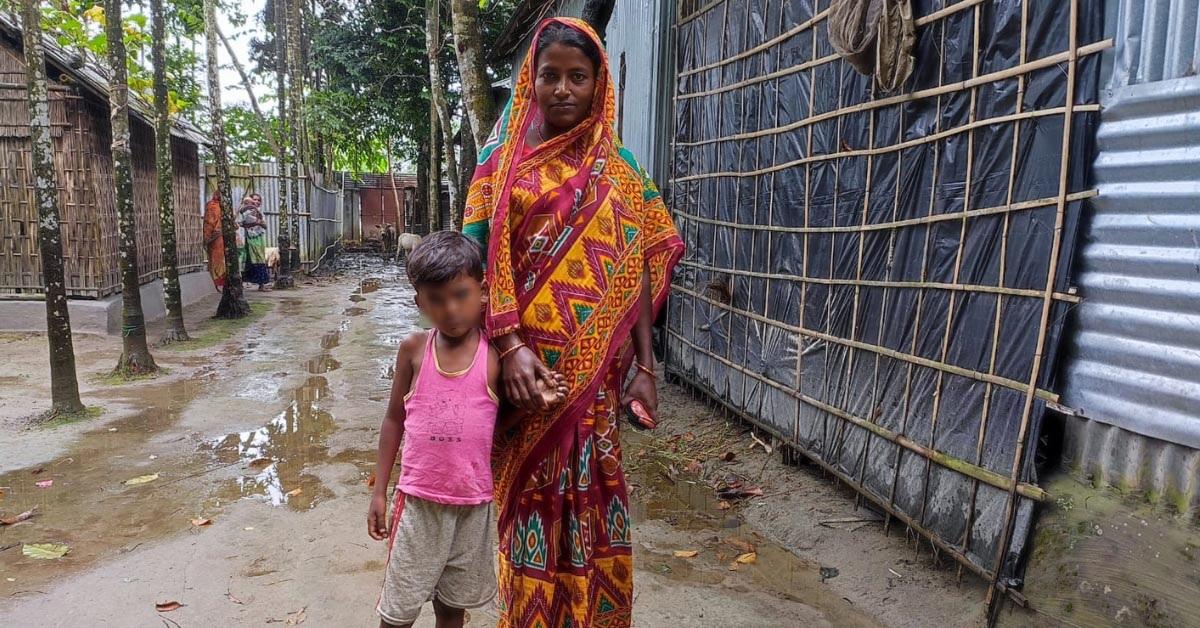Declared a suspected foreigner the minute she went to exercise her freedom to vote, Anjuma struggled for years to regain her citizenship. Now finally, after years of struggle, CJP helps Anjuma regain her lost citizenship.
“I cried alone,” Anjuma acclaimed, as the CJP Team delivered the judgement which granted her freedom from many ills, marking the end of her long and weary struggle.
Anjumanara with her son outside their home in Kaimari Village
Every week, CJP’s dedicated team in Assam, comprising community volunteers, district volunteer motivators, and lawyers, provides vital paralegal support, counseling, and legal aid to many affected by the citizenship crisis in over 24 districts in Assam. Through our hands-on approach, 12,00,000 people successfully submitted completed NRC forms (2017-2019). We fight Foreigner Tribunal cases monthly at the district level. Through these concerted efforts, we have achieved an impressive success rate of 20 cases annually, with individuals successfully obtaining their Indian citizenship. This ground level data ensures informed interventions by CJP in our Constitutional Courts. Your support fuels this crucial work. Stand with us for Equal Rights for All #HelpCJPHelpAssam. Donate NOW!
Anjuma, also known as Anjumanara, is the granddaughter of Geda Sheikh. Despite being born in Assam, she was labelled a ‘Doubtful Voter’ (D-voter) shortly after her name was enrolled in the voter list. The reasons for the move were unclear, but the plight, trauma, and fear that resulted in the wake of this move is always evident on the faces of those affected. Why do certain names and identities receive more such ‘doubt’? Our team on grounds narrates how this is a troubling trend and concern as certain people, it seems, are put through the process due to their identity.
The 1966 voter list is a crucial document for the people of Assam, containing the names of Geda Sheikh and Ahimon Bibi from Kaimari village, Goalpara (now Dhubri) district. Dhubri, located 281 km from Guwahati, has the lowest literacy rate in Assam according to the 2011 census. Despite this, the residents are diligent in preserving their documents.
Anjuma’s father, Amzat Ali used to work tirelessly to support his family. He first voted in the Golokganj Assembly Constituency after being included in the 1989 voter list. With his hard-earned money, he married off his daughter to Matiya Rahman in the same district. “I only wanted a happy life for my daughter,” Amzat had told the CJP team during their first visit to his home.
Anjuma and her husband worked as migrant labourers in the nation’s capital, Delhi for years. They returned to Assam to vote in 2009. But to their dismay they were informed by an officer that Anjuma had been marked as a D-voter. Distressed, she returned to her father’s house, seeking answers. The family was burdened with fear and uncertainty, dreading the possibility of detention. “I cried at night alone for my younger son,” Anjuma admitted that she had greatly feared about who would care for her infant son, Farijul Islam, if she were to be imprisoned in Assam’s notorious detention camps. According to CJP’s data, this fear is legitimate as these detention camps have seen around 29 inmates die.
So, to fight for her fundamental rights, the family worked harder to save money. On October 18, 2022, they moved to a brick factory in Ahmedabad, Gujarat, to earn more. The same day she received a notice from the Agomani Border Branch police asking her to prove her citizenship. Faced with the dilemma of a contractor refusing to let them leave and the need to defend her identity, she took little Farijul and travelled back to Assam the next day.
Her father, on a bicycle, rushed to the Dhubri DVM’s house with the notice. The struggle began on October 22 when Anjuma returned home and faced a long process of gathering proper documentation, appearing before the tribunal monthly, and running from office to office for certified copies. The family compiled strong evidence linking Anjuma to her father, Amzat, and proving her marriage to Matiyar Rahman. They bravely fought against the system attempting to strip her of her citizenship. CJP’s team stood by their side, attending to every requirement, unwaveringly.
Finally, on June 26, when Advocate Ishkander Azad from CJP’s legal team handed her the judgement copy, Anjuma was overwhelmed and in tears, as CJP’s state in-charge Nanda Ghosh and Dhubri district DVM Habibul Bepari stood with her at the end of the long struggle. She spoke with a trembling voice and bright eyes and struggled to express her gratitude for CJP’s invaluable help. Her husband, Farijul, also was present shyly in the background looking overwhelmed with the happenings.
Anjumanara with the CJP Assam Team; Adv Ishkander Azad, State Coordinator Nanda Ghosh and DVM Habibul Bepari
The order may be read here:
Over the years, with their extensive boots on ground approach spread over multiple, including remote, districts of Assam, CJP has helped over 51 victims of the citizenship crisis regain their citizenship.
Related
CJP Assam: Standing Strong Amid Citizenship Crisis and Floods
CJP Assam: Standing strong come hail, come storm
Frequently Asked Questions: Understanding the Citizenship Crisis in Assam
Women at the Forefront of CJP’s Work in Assam
From Fear to Freedom: Sader & Molina’s Citizenship Journey in Assam

